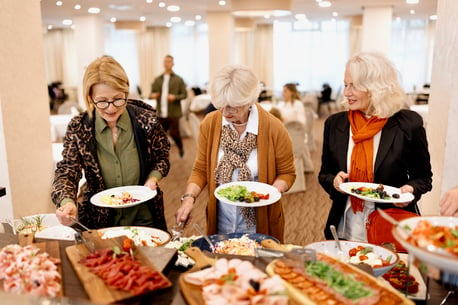Gathering around the family table for a meal is often viewed as a quaint tradition. The truth is, it’s actually an effective medicine. Research shows that people with strong social ties live longer than those who are isolated. A review of 148 studies found that people with richer social relationships had a 50% greater chance of living longer than those who were alone. A meal is one of the simplest ways to build those ties, again and again, day after day. It’s ordinary, repeatable, and doable on any budget or schedule.
 The happiness effect of breaking bread
The happiness effect of breaking bread
Eating together isn’t only pleasant; it’s very good for you. Research on dining with others found that people who share meals report higher life satisfaction, greater trust, and stronger links to their community than regular solo diners. Among older adults, moving from shared meals to eating alone is tied to worsening of mood, showing that mealtimes with two or more can cushion loneliness.
What’s on the plate matters — and company makes all the difference
Who we sit with shapes what we choose. Studies show that dining with others and eating home-cooked food tend to result in healthier patterns and better self-reported well-being, while frequent solo meals often mean lower intake and more skipped meals. In plain terms: friendly company usually means better routine, balance, less snacking and healthier food choices.
 Whole foods plus warm company: A longevity duo
Whole foods plus warm company: A longevity duo
Food quality still counts. Eating a Mediterranean-style diet, one rich in vegetables, legumes, whole grains, fish, and olive oil is consistently linked to healthier ageing. Having an active social life also helps us stick with healthy choices in later life — the people around us can influence what is on our plates. Combine the body benefits of whole foods with connection, and you have a viable path to a longer life.
The daily ritual that builds resilience
So why is a shared lunch or supper so beneficial? Regular, friendly meals set a steady rhythm, helping appetite and sleep. They also deliver small but frequent lifts — conversation, laughter, and the feeling of being noticed — which are linked with better cognitive function and mood in later years. Community studies repeatedly connect shared meals with sharper minds and less depression, while solitary eating points the other way.
A public-health nudge you can taste
If this were a pill, it would be regularly prescribed: eat mostly whole foods, with other people, as often as you can. The evidence doesn’t romanticize the dinner table; it measures it. Stronger social ties cut mortality risk and, conveniently, regular meals together help build those ties. Whole-food diets lower chronic disease risks and social participation helps you stick to them. It’s an affordable fix hidden in plain sight — set the table, invite someone, eat wisely, and let the habit build.
 How to start (even if you usually eat alone)
How to start (even if you usually eat alone)
Begin small and steady: a weekly soup night with neighbours, a standing café breakfast with a friend, a shared pot of tea after a class. Cook one extra portion and trade with someone in your apartment block or down the road. Community centres and retirement residences often host low-cost or complimentary lunches — solid, social nourishment wrapped in a meal. Your body will thank you; so will your future self.
When every meal is thoughtfully prepared for you and enjoyed among friends, eating well becomes effortless — and life feels a little richer each day. Discover how good dining, and good company, can make every day more enjoyable at Aspira.

Wondering what comes next or need more advice? Download our Guide for Loved Ones to learn more.


